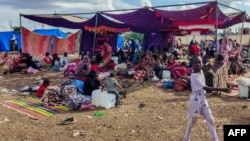The U.N. secretary-general on Friday strongly condemned recent attacks in Sudan's Al Jazirah state by the paramilitary Rapid Support Forces and reiterated his call for the war to end.
"The secretary-general is appalled by large numbers of civilians being killed, being detained or being displaced, as well as acts of sexual violence against women and girls, the looting of homes and the looting of markets and the burning of farms," spokesperson Stephane Dujarric told reporters.
"Such acts may constitute serious violations of international humanitarian law and human rights law. Perpetrators of such serious violations must be held to account."
From October 20 to 30, the Rapid Support Forces (RSF) carried out major attacks in villages across eastern Al Jazirah state, reportedly killing more than 120 civilians.
The International Organization for Migration said Friday that more than 135,000 people have fled the area in the past week, with most going to Gedaref and Kassala states.
The U.N. office for humanitarian affairs says it and its partners, especially local organizations and volunteers, are supporting thousands of the new arrivals with humanitarian aid, mental health support, family reunification services and other assistance.
The RSF has been locked in battle with the Sudanese Armed Forces (SAF) for nearly 19 months, since their leaders turned against one another and engaged in a power struggle that has tipped the nation into catastrophe.
Dujarric said the U.N. chief is alarmed that the humanitarian situation continues to worsen and "demands" that all parties to the conflict facilitate "safe, rapid and unimpeded humanitarian access to all civilians in need in Sudan."
Eleven million people have been displaced and half of Sudan's population, an estimated 25 million people, are struggling with crisis levels of food insecurity. Famine was confirmed in August in parts of Sudan's Darfur region. At least 14 other areas of Sudan are considered at risk of famine in the coming months. Meanwhile, diseases, including cholera, are spreading.
"The secretary-general renews his call for a cease-fire to spare Sudanese civilians from further harm," Dujarric said.
Security Council action
Assistance has been slow to reach the Sudanese because of the fighting and lack of access to parts of the country.
In August, the government reopened a critical border crossing from Chad that it had closed because it feared the RSF was using it to smuggle in arms and other war materiel. The Adre crossing reopened for an initial three-month period, which will expire on November 16. Humanitarians and diplomats have urged that it be permanently reopened.
Britain assumed the rotating presidency of the U.N. Security Council on Friday, and Ambassador Barbara Woodward told reporters that scaling up the humanitarian response is a priority for the U.K.
"Even since the Adre border opened in August, fewer than 30 trucks of aid are getting in per week, and that is nowhere near enough to meet the needs of 9 million people suffering in Darfur," she said.
She said use of the border crossing must be renewed and "all possible routes" for aid – whether across borders or conflict front lines – must be maximized.
"If they're not, countless lives will be lost," Woodward said.
On Monday, Sudan's U.N. ambassador, Al-Harith Idriss Al-Harith Mohamed, told Security Council members that his government had opened nine crossings in addition to Adre and seven airports for humanitarians. But he cautioned that his government needed to review every three months and consider the security risks of keeping Adre open.
"The border crossing at Adre is really a threat to national security," Mohamed said.
Britain's Woodward said her delegation would convene a meeting on Sudan on November 12 to be chaired by the U.K.'s minister for the United Nations and Africa, Lord Collins of Highbury, to focus on the protection of civilians and the scaling up of aid.
She said Britain, which leads the negotiating and drafting of resolutions on Sudan, would soon circulate a draft resolution to Security Council members.
"The draft resolution will be based on the secretary-general's recommendations and will focus on developing a compliance mechanism for the warring parties' commitments they made on the protection of civilians in Jeddah over a year ago, in 2023, and ways to support mediation efforts to deliver a cease-fire, even if we start with local cease-fires before moving to a national one," she said.
Just weeks after the fighting erupted, the SAF and RSF signed a declaration in Saudi Arabia reaffirming their obligations under international humanitarian law to protect civilians and facilitate humanitarian aid for them, including precautions to avoid and minimize civilian harm, which both sides have failed to do.




